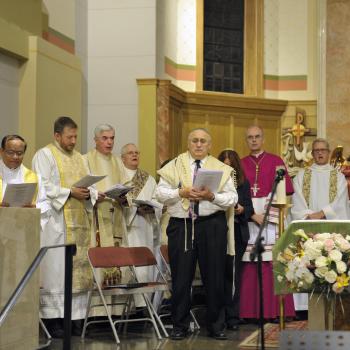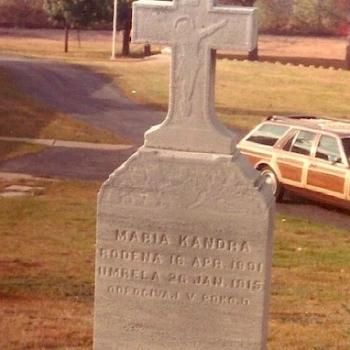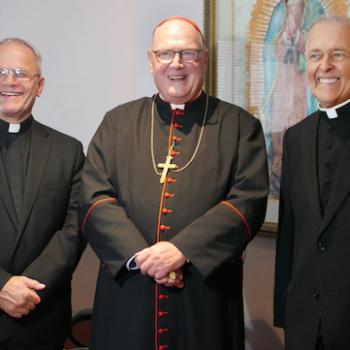From the Shameless Self Promotion Desk:
Catholic News Service, via the Boston Pilot, has a writeup on the blogging panel I took part in last week in Indianapolis:
Blogging offers the Catholic Church one more way to evangelize for the faith while reaching new audiences, especially young people, a panel of Catholic bloggers told a packed room during the Catholic Media Conference in Indianapolis.
The panelists, which included Bishop Christopher J. Coyne, apostolic administrator of the Archdiocese of Indianapolis, a frequent user of Twitter, agreed that while not all bloggers are official church representatives, the relatively new but quickly growing form of communication has influenced how the church spreads its message.
They also said during the June 22 session that blogging, like any communication tool, must be used responsibly.
Elizabeth Scalia, managing editor of the Catholic portal at Patheos.com and writer of a blog named The Anchoress, said that traditional print publications, such as diocesan newspapers, with a strong Internet presence can act quickly to clarify misperceptions about the church in the mainstream media.
She suggested that the newspaper blogs could track a story and make corrections in real time, providing an overview of an event until publication day.
While the longevity of blogs may be short-lived, Scalia said that their impact can be long term.
“Put your stuff on the Internet and for better or worse, it’s there forever,” she said. “In a way that gives the Holy Spirit some room to work. A thing you wrote three years ago and forgot about may come up in the Google search of someone who really needs to see it, and suddenly evangelization, tailor-made for that person, happens.”
Rocco Palmo, writer of the widely-followed blog of church news and rumors called Whispers in Loggia, said he began blogging in 2004 “for three readers.” Today, the cumulative hit count on Whispers is more than 23 million.
Because of the popularity of Catholic blogs, Palmo said that the church has much to offer people involved in social media. In particular, he cited Pope Benedict XI’s message for World Communications Day 2012, observed May 20, which emphasized the need for silence in good communications.
“It was risky because it could have been read, ‘Pope to bloggers: Shut up.’ It could have been spun that way,” Palmo said. “But it wasn’t. … It struck a nerve in our (media) inundated society about when you should turn off (digital devices). It’s important to unplug.”
The pope’s message marked one of the first times that the church’s message about technology and society was taken up after many years of perception that the church was behind the times, he said.
Bishop Coyne said he sees himself as a missionary on the Internet.
“I approach the new social media both as a means of evangelization and I’m also trying in my own way to evangelize the new social media, to make it more of Christ, more of God, more of the good,” he said.
Although he frequently posted to his blog — online at www.thoughtsofacatholicbishop.blogspot.com — as a priest and early on after his episcopal ordination, he said he posts items less frequently in part because blogging is more of a passive medium that people must chose to visit.
“In terms of Facebook and Twitter, it’s going out,” Bishop Coyne said. “Now, granted, people have to follow you. But there is more movement (going) out there, which I think is more in keeping with (Christ’s command to) go out to all the world and spread the good news. It’s more directive from me.”
RELATED:












